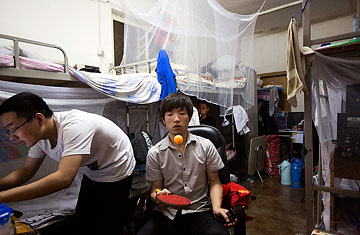
A bug's life Members of Beijing's low-paid or unemployed "ant tribe" kill time in their shared tenement
On a rare blue-sky day in late May, Zhang Kuan roared down the highway from Beijing to the industrial port city of Tianjin. The 32-year-old's mission? To pick up his new gunmetal-gray McLaren MP4-12C (price tag: $870,000). The founder in 2009 of the Beijing Sports Car Club, Zhang has parlayed his self-made fortune — derived, he says vaguely, from "finance businesses, like investment, real estate, insurance" — into his true passion.
On weekends, the buzz-cut-sporting Beijing native — attired in the T-shirt, sneaker and dog-tag ensemble of the global street — gathers with other youthful members of China's new rich to show off their automotive treasures. As Zhang coaxes a throaty growl out of one supercar, each of which costs a minimum of $200,000, a flock of opulently tressed and scantily dressed female companions smiles encouragingly. The club, which now boasts 700 members nationwide, has also organized rent-a-luxury-car tours of Las Vegas, Southeast Asia and Europe.
It's all quite a change for a man from a modest family background who bought his first vehicle, a boxy Volkswagen Santana, in 1999. Less than a decade later, in a turbocharged upgrade that symbolizes how quickly fortunes are made in China, Zhang acquired a Ferrari and then a lime-green Lamborghini — today just part of his fleet of ultra-fast autos. "My father's generation, they don't crave things like I do," says Zhang, who also indulges in high-end watches, cigars and alcohol. "His luxury is for the whole family to be together. People in my generation, we always want the next thing. It's how we express ourselves and live our dreams."
That same afternoon in a grimy stretch of north Beijing, where thick dust coats the fresh green of weeping willows, Yin Junqin idles away another day of deferred dreams. The 26-year-old dips into a book on ancient Chinese history, shoots some hoops and catches up on the day's headlines online. Sustenance comes from a $1.50 lamb-bone soup. By all accounts, Yin should be a success story. The studious son of pig farmers, he was the first member of his family to attend college, graduating from a top technology university in the port city of Qingdao. Yet upon heading to Beijing four years ago, his career stalled before it even began. "I came imagining success," he says, "but the reality has been cruel."
The longest job Yin has managed to hold down was for six months, and the salaries he commands aren't better than those of a migrant laborer. Right now he's between jobs again and living in a dingy dorm filled with other members of the so-called ant tribe — the millions of unemployed or poorly paid college graduates who are packed together in urban tenements. "If you go back home to the countryside without a job, then you've failed," Yin says, sitting on his bottom bunk, surrounded by a laptop, self-help manuals and biographies of successful entrepreneurs. A suit bag hangs from the side of the bed, and he promises that he will start passing out résumés again soon. Meanwhile, a roommate hunches over a computer, coding software for his insatiable bosses. "For my parents' generation," Yin says, "not starving was enough. For me, I want a lot more."
Every generation can claim singularity, but the roughly 250 million Chinese born after 1980 who are now in the job market are truly a breed apart. Products of China's one-child policy, these coddled youngsters are the first in the history of the People's Republic to have no memory of the chaos and deprivation of the first decades of Communist Party rule. They are the future of a presumptive superpower and, in that respect, seem destined to play a colossal role in the future of humanity itself.
Over the past half-century, China has moved more people out of poverty than the entire U.S. population. Almost all rich are nouveau, and the average age of China's moneyed class is far younger than in the West. Even those who can only dream about cruising in a luxury auto are experiencing unprecedented freedoms. "This is the first generation in modern China that has been allowed to make real choices about its future," says Mary Bergstrom, the Shanghai-based author of All Eyes East: Lessons from the Front Lines of Marketing to China's Youth. "They're pioneers, whether it comes to their careers, traveling inside and outside of China, or taking advantage of all these different technologies that are transforming the country."
In many ways, the urban, educated fringes of the youth bulge — both the flashy supercar owners and the ant tribe — will characterize their generation more than those occupying the statistical middle ground. The country's ever widening wealth gap is creating a society of haves and have-nots that communism was supposed to abolish. The leadership, which will undergo a once-a-decade transition later this year, is well aware that the tensions related to income disparity and unequal access to opportunity could prove as combustible a mix as the peasant rebellions of the past. "You can still see hope for the future among China's youth," says Lian Si, the Beijing sociologist who coined the term ant tribe. "But over the last couple of years, expectations have been dropping because some educated people can't find satisfying work. If this trend continues in China, it will endanger social harmony." That possibility is very real. After all, one of the catalysts of Tunisia's Jasmine Revolution was the self-immolation of Mohamed Bouazizi, a 26-year-old frustrated by his lack of prospects.
